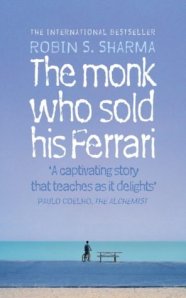
For a book that has sold over 3 million copies, I found it tremendously difficult to infiltrate beyond the hype. Even Paulo Coelho, an author I enjoy, has endowed much praise upon this book. To be frank, I just cannot understand why…
The writing style is simplistic, bouncing like a volleyball between John (the stories narrator), and Julian Mantle, a high powered, driven lawyer who ends up cashing in all the materialistic spoils of his long, successful career for a far more simplistic life.
Although the message of the story is as potent and promising as any self help guide, i.e. achieve balance, simplicity and harmony in your life to achieve happiness, there is something terribly patronizing and repetitive about the telling.
A clash of modern day mania meets fable, Julian confides in John, explaining how and why he gave it all up in order to reach a more personally fulfilling destiny. Julian, living a life of hedonism and extraordinary excess, is fumbled by a heart attack and spiritually, begins to take stock of his life. Julian parts with his wealth and travels to India – long renowned land of mystique and intrigue. Whilst there, he stumbles upon the Sages of Sivana, ageless inhabitants of a rose obscured refuge in the Himalayas. They share with Julian their secrets for a truly prosperous life, which he in turn shares with John, three years after his disappearance from the legal eagle world, which John then narrates for the reader.
Julian’s advice centres of seven particular virtues that expand the enjoyment of one’s life. Such techniques include facing fears rather than bowing to them, exiting the rat race as it exists (as a race against competitors) and race only against yourself, condition your mind to perform in the way you would like, altering the way you respond to setbacks and life occurrences in order to establish your destiny, the idea that all life limitations are self-imposed rather than external and focusing on what you would wish you had done on your deathbed.
He also refers to several symbols such as the rose garden (representative of mental processes and being sure to attend to invasive weeds), the magnificent lighthouse (your purpose in life) and the diamond path (the ability to serve others).
The fable format makes it a little more palatable than a to do list for self-improvement, but I just felt it could have been written in a better and more engaging style, with a little more maturity.
It’s not that the advice isn’t valuable, truthful and ideal for those reading, it’s just that for me, despite its simplicity and structure, it was a bore to read. It felt pompous, false and pretentious, but obviously, over 3 million fans can’t be wrong. As such I would advise that you do read this if you desire to, but perhaps keep your expectations a little low! And if you do have a Ferrari, don’t necessarily be in a rush to sell it!
No comments:
Post a Comment